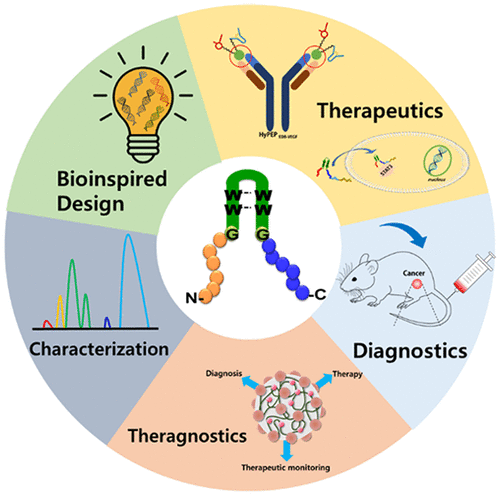当前位置:
X-MOL 学术
›
Acc. Chem. Res.
›
论文详情
Our official English website, www.x-mol.net, welcomes your feedback! (Note: you will need to create a separate account there.)
Biomedical Applications of a Novel Class of High-Affinity Peptides
Accounts of Chemical Research ( IF 18.3 ) Pub Date : 2021-08-18 , DOI: 10.1021/acs.accounts.1c00239 Phei Er Saw 1, 2 , Xiaoding Xu 1, 2 , Sunghyun Kim 3 , Sangyong Jon 4, 5
Accounts of Chemical Research ( IF 18.3 ) Pub Date : 2021-08-18 , DOI: 10.1021/acs.accounts.1c00239 Phei Er Saw 1, 2 , Xiaoding Xu 1, 2 , Sunghyun Kim 3 , Sangyong Jon 4, 5
Affiliation

|
Most therapeutic peptides available on the market today are naturally occurring hormones or protein fragments that were serendipitously discovered to possess therapeutic effects. However, the limited repertoire of available natural resources presents difficulties for the development of new peptide drug candidates. Traditional peptides possess several shortcomings that must be addressed for biomedical applications, including relatively low affinity or specificity toward biological targets compared to antibody- and protein scaffold-based affinity molecules, poor in vivo stability owing to rapid enzymatic degradation, and rapid clearance from circulation owing to their small size. Going forward, it will be increasingly important for scientists to develop novel classes of high-affinity and -specificity peptides against desired targets that mitigate these limitations while remaining compatible with pharmaceutical manufacturing processes. Recently, several highly constrained, artificial cyclic peptides have emerged as platforms capable of generating high-affinity peptide binders against various disease-associated protein targets by combining with phage or mRNA display method, some of which have entered clinical trials. In contrast, although linear peptides are relatively easy to synthesize cost-effectively and modify site-specifically at either N- or C-termini compared to cyclic peptides, there have been few linear peptide-based platforms that can provide high-affinity and -specificity peptide binders.
中文翻译:

一类新型高亲和力肽的生物医学应用
当今市场上可用的大多数治疗性肽是天然存在的激素或蛋白质片段,被偶然发现具有治疗作用。然而,可用自然资源的有限库为新肽候选药物的开发带来了困难。传统肽具有一些必须在生物医学应用中解决的缺点,包括与基于抗体和蛋白质支架的亲和分子相比,对生物靶标的亲和力或特异性相对较低,在体内较差由于快速酶促降解而稳定,并且由于其体积小而从循环中快速清除。展望未来,科学家开发针对所需靶标的新型高亲和力和特异性肽类将越来越重要,以减轻这些限制,同时保持与制药工艺的兼容性。最近,一些高度受限的人工环肽已成为能够通过结合噬菌体或 mRNA 展示方法产生针对各种疾病相关蛋白靶标的高亲和力肽结合剂的平台,其中一些已进入临床试验。相比之下,尽管与环状肽相比,线性肽相对容易合成,并且在 N 端或 C 端进行位点特异性修饰,并且具有成本效益,
更新日期:2021-09-21
中文翻译:

一类新型高亲和力肽的生物医学应用
当今市场上可用的大多数治疗性肽是天然存在的激素或蛋白质片段,被偶然发现具有治疗作用。然而,可用自然资源的有限库为新肽候选药物的开发带来了困难。传统肽具有一些必须在生物医学应用中解决的缺点,包括与基于抗体和蛋白质支架的亲和分子相比,对生物靶标的亲和力或特异性相对较低,在体内较差由于快速酶促降解而稳定,并且由于其体积小而从循环中快速清除。展望未来,科学家开发针对所需靶标的新型高亲和力和特异性肽类将越来越重要,以减轻这些限制,同时保持与制药工艺的兼容性。最近,一些高度受限的人工环肽已成为能够通过结合噬菌体或 mRNA 展示方法产生针对各种疾病相关蛋白靶标的高亲和力肽结合剂的平台,其中一些已进入临床试验。相比之下,尽管与环状肽相比,线性肽相对容易合成,并且在 N 端或 C 端进行位点特异性修饰,并且具有成本效益,



























 京公网安备 11010802027423号
京公网安备 11010802027423号